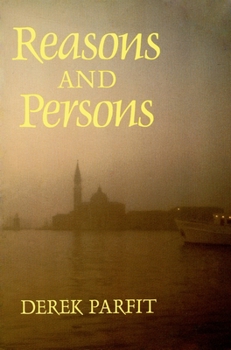Reasons and Persons
Select Format
Select Condition 
Book Overview
Challenging, with several powerful arguments, some of our deepest beliefs about rationality, morality, and personal identity, Derek Parfit claims that we have a false view about our own nature. It is often rational to act against our own best interests, he argues, and most of us have moral views that are self-defeating. We often act wrongly, although we know there will be no one with serious grounds for complaint, and when we consider future generations it is very hard to avoid conclusions that most of us will find very disturbing.
Format:Paperback
Language:English
ISBN:B006QV7ZMS
ISBN13:9780198249085
Release Date:February 1986
Publisher:Oxford University Press
Length:560 Pages
Weight:1.15 lbs.
Dimensions:1.2" x 5.2" x 7.7"
Customer Reviews
4 ratings
A first-rate work about personal identity...
Published by Thriftbooks.com User , 22 years ago
Having read enough books about personal identity to choke a horse, I can assure you that this is one of the titles that stands above most others. Parfit's book is excellent because it covers a lot of ground, but it isn't bogged down with a lot of jargon.He gives many great analogies that challenge the standard ways we think about a person's identity over time...and his conclusion will probably shock those who aren't used to abstract philosophical ideas.
Do not ignore this book...
Published by Thriftbooks.com User , 22 years ago
As a graduate student of philosophy doing a thesis on personal identity, I'd say that this is one of the best books available on the topic for several reasons: 1)the scope of the material that is covered; 2) the prose is very smooth - this should be an accessible read for most people; 3) Parfit's analogies are very instructive in challenging our commonsense views of personal identity.Anyone who has read and enjoyed books by John Searle and Daniel Dennett will probably appreciate Parfit's work.
Big, long, and hard to summarize
Published by Thriftbooks.com User , 22 years ago
This isn't an easy book either to read or to review, and I don't expect I'll be able to provide an adequate summary of it here. But it's one of those massively important books that there's just no way to get around. It's easily the most weighty and thorough work of utilitarian ethics since Henry Sidgwick's _The Methods of Ethics_, and it has something of Sidgwick's spirit of judicious reasonableness.Derek Parfit exploded onto the scene with this book in 1984. His work is a goldmine of helpful reflections on, and criticisms of, our ordinary notions of moral behavior, rationality, and personality.The work is divided into four major parts. In the first, he argues that many of our common-sense moral theories are "self-defeating" in the manner of a Prisoner's Dilemma (which, by the way, is the part that first interested me in the book). In the second, he considers the relations between rationality and time and worries about how we should take the past and the future into ethical account. In the third, he offers a theory of personal identity and its relations to morality. In the fourth, he considers the role that future generations ought to play in our moral deliberations.Well, sure enough, that's _not_ an adequate summary. I haven't even begun to convey the sheer virtuousity with which Parfit raises objections, makes distinctions, brings out difficulties that are so un-obvious that nobody ever noticed them before, and generally develops his arguments with clarity and vigor. Heck, I haven't even adequately conveyed his views themselves.So I guess you'll just have to do what I did: read the book. If you have any interest in ethics, you're going to have to read it _sometime_. So get a copy, put it on your bookshelf, take it down and browse through it once in a while.I'm no utilitarian myself, but if you want to study utilitarian ethical theory, you'll want to read not only this book but also Sidgwick's aforementioned _The Methods of Ethics_. You probably already know to look for Bentham and Mill, and you've probably heard of Samuel Scheffler; you may also want to scare up a copy of Hastings Rashdall's _Theory of Good and Evil_. More recent not-well-known works of a broadly utilitarian bent include Brand Blanshard's _Reason and Goodness_ and Timothy Sprigge's _The Rational Foundations of Ethics_.And on the "con" side, don't overlook F.H. Bradley's _Ethical Studies_, W.D. Ross's _The Right and the Good_ and _The Foundations of Ethics_, and the critiques of Bernard O. Williams.
Philosophical Equivalent of a Neutron Bomb
Published by Thriftbooks.com User , 23 years ago
When I first read this book on a trip across Europe, I was blown away: I remember thinking again and again "How can something this blow-the-roof-off important be published so late in the game?" Parfit shows how some of our most common-sensical beliefs about self-interest, ethics, personal identity, and (perhaps most interestingly) our obligations to future generations are beset with surprising and thorny problems, or even flatly self-contradictory or incoherent. He's also the master of the subtle-but-important distinction. Probably several longish books could be spun out from all the original material in Reasons and Persons-- certainly many journal articles already have been! However: while Parfit's style is very clear, and he doesn't refer as extensively as some philosophers to the work of previous authors, I probably wouldn't want to tackle this bad boy without at least some training in philosophy.






